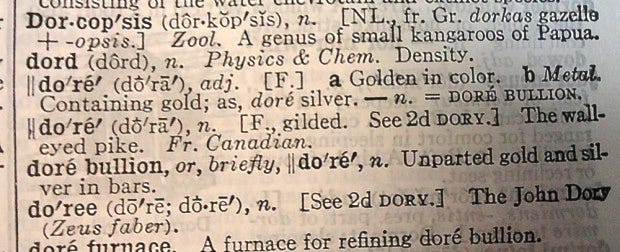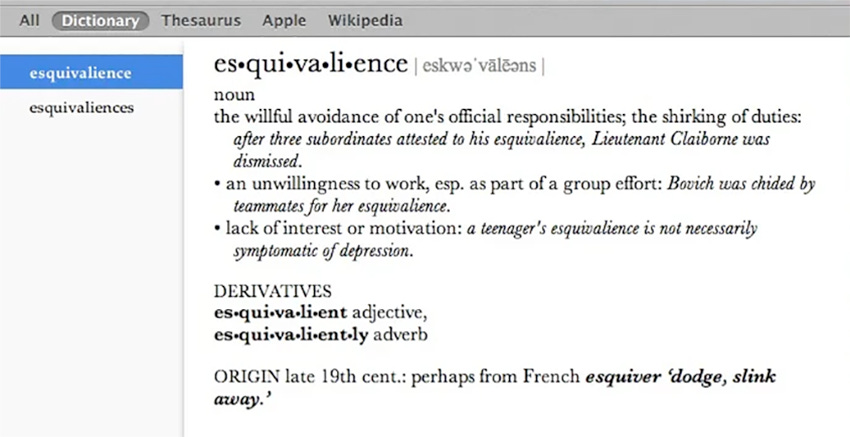The Mysterious 'Ghost Words' That Sneak Into Dictionaries at Night
Pour one out for “Dord” and her ghostly friends.
Skip to the end (or click here) for a puzzle I’ve made you. My crash course on how to do cryptic puzzles begins here.
There once was a word that never existed, except in our hearts, and the Merriam-Webster dictionary. Her name was Dord, and she had a strikingly offbeat way about her, like Dorp (n. a small village or hamlet) and Adorkable (Zooey Deschanel, usually). Those who saw her or heard her name would marvel that such a small word could hold so much promise — no other four-letter English words (they would say) apart from Dard (n. a group of Indic languages) and Drad (a wicked word that once served as the past participle of “Dread,” before it was rightfully banished from the language) had ever dared to put a third consonant between two d’s. Dyad, Duad, and Deed looked crabwise at Dord from nearby pages in the dictionary like she was raving.

But Dord had a secret, and her secret was that she had no meaning at all. She had a splendid definition, certainly. It was right there next to her name:
dord (dôrd), n. Physics & Chem. Density.
But the definition was a disguise — a cloak donned in haste as she slipped into the dictionary one night, a plucky little bundle of letters who dared to stand shoulder to shoulder with all the words in the world, even though she lacked the one thing that all words have in common.

Dord was discovered on February 28, 1939, by an editor who grew suspicious about her lack of an etymology. A frenzied investigation revealed that she had begun life on a 3x5 index card — written by the dictionary’s Special Editor for Chemistry, Austin M. Patterson — as “D or d, cont. / Density,” an indication that “Density” could be abbreviated with the upper- or the lowercase “d.” Another index card was rushed to the printer, marked “plate change /imperative / urgent,” and Dord was banished, with a subsequent entry (doré furnace) gaining a few extra words in its definition to fill the void left by her departure.

Quickthinking Dord had availed herself of a series of mistranscriptions and leapt from obscurity into infamy — a word with no meaning but enough spirit to defy the dictionary itself. She lived for five years, and she was mourned by none other than Webster Editor in Chief P. B. Gove, who said (heartbreakingly) of her demise:
“Probably too bad, for why shouldn’t dord mean ‘density’?”
Dord had a brother, who was as ugly as she was beautiful. As miscontrived and maladjusted as she was hopeful and sweet. His name was Esquivalience, and his business was mischief and strife. Esquivalience was a Mountweazel (a phrase all the more delicious to utter because of its villainous inhabitants), which is to say that he was a trap, a cuckoo’s egg, a nasty piece of work set upon a nasty piece of business. The original Mountweazel was Lillian Virginia Mountweazel, a photographer who “died at 31 in an explosion while on assignment for Combustibles magazine,” except that she wasn’t and she didn’t, because Mountweazel was a fake entry in the 1975 edition of the New Columbia Encyclopedia designed to catch Encyclopedia plagiarists in the act.
Like his cousin Mountweazel, Esquivalience’s real purpose in life was to ensnare plagiarists, and like his sister Dord, he had a definition but no actual meaning.
esquivalience , n. The willful avoidance of one’s official responsibilities; the shirking of duties.

Esquivalience was not a word but a decoy, crafted in a laboratory and placed in the 2001 first edition of the New Oxford American Dictionary as a somewhat pointed way of outing copycat dictionaries. His subsequent appearance in various online dictionaries has shown him to be ruthlessly effective at his job.

And for all the double-dealing and subterfuge, Esquivalience is no unloved orphan. His creator, Christine Lindberg, defended his honor to the Chicago Tribune when he was first discovered in 2005:
“It is only this recent bit of attention to my infamous little neologism that has reminded me of its fauxness. I find myself using the word regularly, and I've grown quite fond of it. I especially like the critical, judgmental tone I can get out of it: ‘Those esquivalient little wretches.’ Sounds literate and nasty all in one breath. I like that.”
Dord and Esquivalience are probably the most famous of the ghost words, a term coined by the Victorian philologist W. W. Skeat for:
“... words which never had any real existence, being mere coinages due to the blunders of printers or scribes, or to the perfervid imagination of ignorant or blundering editors.”

But they are not the only ones, and if you’re lucky enough to happen upon the right old manuscript or dictionary, you may encounter the troubled shades of their brethren, such as Momblishness, Clenge, and Shrake, or Foupe, Adventine, and Kime, howling in the void with a strangely human sound that yearns for a meaning they can never quite reach.
Anyway, pour one out for Dord tonight. She deserved better than what she got.
I have made you a puzzle. The puzzle image is below if you want to print it out like our forebears used to, but you can also fill it in with a click! (The solution is explained and annotated here.)




